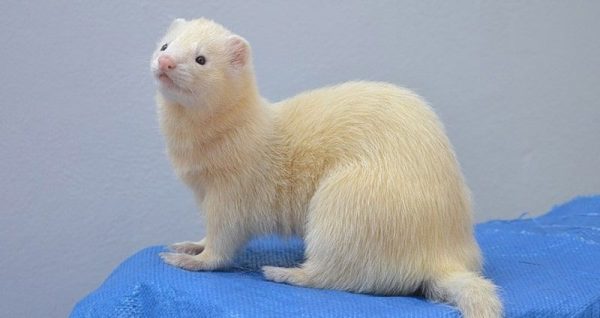Dark-Eyed White Ferrets (DEW) are the recommended ferrets if you love the albino ones. They look just as white but they are much healthier than them. They’re also a great choice if you’re the type of person that finds red eyes very unsettling.

Many people confuse Dark-Eyed White Ferrets with albinos because they’re both white. But as the name suggests, the white ones have dark eyes while the albinos have red eyes due to lack of pigmentation in the iris. All ferrets have similar needs and grooming requirements, but each ferret has his own personality and habits.
What do Dark-eyed White Ferrets (DEW) Ferrets Look Like?
Dark-Eyed White Ferrets have both their topcoat and their undercoat naturally very white. This makes them very different than albino ferrets, despite looking almost exactly the same. The differences stand in their health problems.
Albinos are widely known to be prone to deafness, blindness, and other health issues, while the Dark-Eyed White Ferrets are as healthy as any other ferret. This is why they’re also widely recommended all over the world over the albino ferrets by any expert.
But you should keep in mind that not all Dark-Eyed White Ferrets are completely white. Some of them might have a few dark hairs around the backbone that don’t generally change as the ferrets get older. But they’re not very common and the typical Dark-Eyed White Ferret is completely white.
One of the most beautiful things about these ferrets is their black eyes. They complement their white fur very well and makes them look extremely adorable. And their nose is another cute feature as it can be either pink or black.
Besides Dark-Eyed White and albino ferrets, you can also find ferrets with coats that are black, black sable, blaze, chocolate, champagne, and cinnamon. Albinos can be found anywhere, while cinnamon ferrets are incredibly hard to find. There are also 12 extra shades and patterns you can choose from.
Grooming Ferret Coats – Brushing and Bathing
Before starting to brush your ferret it’s always ideal to chop a few chunks of meat so you can use them as treats during the grooming process. You can use any type of treat your ferret loves just as long as you remember to extract it from its daily food ratio later.
Ferrets are not the type of animals that will let you just pick them up and pet them whenever you want, especially if they don’t trust you 100% yet. So it might be better to just wait until he comes to you or simply lure him to you with a chunk of meat.
The first meeting with the brush might be a bit difficult and the ferret might even try to start a fight with it. But it’s completely normal to hate new objects that he doesn’t know what they do. Once he understands that it’s for brushing, you can start doing it in slow motions starting from the shoulders to the tail.
If the ferret has too much energy to be able to stay still, don’t scold it as this will make it scared of you and scared of any brushing session. For the first few times, it will be harder and you will need to work as quickly as you can. But with time things will get easier for both of you as trust is built slowly but surely.
Bathe your ferret only in extreme cases, as washing all its natural oils can cause the skin to break down and cause several serious problems. More than that, its glands will start releasing a lot more oils to ensure the ferret’s skin and fur is back to normal. This will make the musky smell stronger for two or three days.
Keeping your ferret’s cage clean along with everything it sleeps in or plays with plays a big part in containing the musky smell. The litter box should also be cleaned every single day. And before each bath, you should disinfect everything your ferret touches and change the litter and sleeping bed. Otherwise, the bath can be undone in just an hour or less.
Frequently Asked Questions:
What are the most common types of ferret coats?
There are 8 typical types of ferret coats and they’re Cinnamon, Chocolate, Champagne, Blaze, Black, Black Sable, Dark-Eyed White, and Albinos. Some are very common while others are extremely rare.
Are DEW Ferrets difficult to care for?
Dark-Eyed White Ferrets are a delight to take care of as they’re clean and you can get them used to water while they’re still young. This makes the grooming days a piece of cake.
